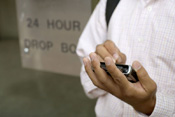How Pinpoint technology can keep your finances secure

Since fraud is a growing problem, several programs have been launched to help keep your bank account information safe and to ensure no one is stealing your identity. Cell phones relay your information to satellites and it is possible to gather your location from your cell phone provider. With this type of location control out there it has caused some phone providers to look at how they can use this to their advantage by mapping your location and relaying it to your bank. This way when you have a transaction done, your cell phone connects with your bank to protect your identity and to show that it is you.
Using identity theft protection
 Protecting your identity is one of the most-important things you can do. Identity theft is ramped and a thief will steal your identity in a matter of seconds. To protect yourself, many online companies are offering identity theft protection. Most credit card companies offer identity theft protection and they will alert you the second there is questionable activity on your account. Even with the credit card monitoring services, it is a wise decision to invest in identity theft protection. Theft protection will protect from different types of scams and they will help you recoup the money that was lost to fraudulent activity.
Protecting your identity is one of the most-important things you can do. Identity theft is ramped and a thief will steal your identity in a matter of seconds. To protect yourself, many online companies are offering identity theft protection. Most credit card companies offer identity theft protection and they will alert you the second there is questionable activity on your account. Even with the credit card monitoring services, it is a wise decision to invest in identity theft protection. Theft protection will protect from different types of scams and they will help you recoup the money that was lost to fraudulent activity.
Wireless network protection
 Companies must be careful when they set up a wireless network because without proper protection, anyone can hack into it and compromise valuable information. There are several devices like laptops that detect wireless signals and they will automatically connect to them. A single Wi-Fi hub will transmit at a range of 300 feet. Here are a few reasons why you need to secure your wireless protection:
Companies must be careful when they set up a wireless network because without proper protection, anyone can hack into it and compromise valuable information. There are several devices like laptops that detect wireless signals and they will automatically connect to them. A single Wi-Fi hub will transmit at a range of 300 feet. Here are a few reasons why you need to secure your wireless protection:
How to protect yourself online
 Online security threats are enough to scare anyone from accessing their bank account information and from transmitting any personal information over the internet. Browsing the internet doesn't need to be a scary thing, it should be safe and secure for anyone. If you are worried about your personal information being compromised, here are some tips that may help you stay protected:
Online security threats are enough to scare anyone from accessing their bank account information and from transmitting any personal information over the internet. Browsing the internet doesn't need to be a scary thing, it should be safe and secure for anyone. If you are worried about your personal information being compromised, here are some tips that may help you stay protected:
What is a site heatmap and how can I read them?
Aggregate heatmaps are used by researchers to identify and map exactly where people look when they're presented with visual information.They often use pupil tracking equipment.For website purposes, heatmaps are also employed but rather than tracking where people are looking, you can track where they are actually clicking to see what is most intriguing to viewers.
If you own a web site, it may interest you to know what users do while visiting your site.Clickmaps or heatmaps are a way of charting statistics to visually show you where users are clicking.This information can be very useful in finding areas that need to be changed, layouts that aren't working as intended or anchors that aren't being understood as you would like.
Continue reading "What is a site heatmap and how can I read them?"Three Steps To Windows Safety Heaven
Now there are Three Steps To Heaven
Just listen and you will plainly see
How virus and hackers attack and destroy
Your precious internet-connected computer toy
Just follow steps one, two and three
Step one - Run windows update automatically each day
Step Two - Always keep your antivirus running and updated
Step Three - Install and configure a firewall
Faster Virus
Today can many viruses find and infect a computer connecting to internet in less then 5 minutes, even if the computer connects to internet using a modem. And how much time will the 24/7 connected computer not give the bad guys?
So leaving a computer without proper protection is not advisable.
What to do?
There are measures one can do to bring down the risk of intrusion, virus attacks and similar, to a level so low that it is acceptable even for a large corporation.
Continue reading "Three Steps To Windows Safety Heaven"How to Watch Someone Else's Laptop Screen- with Your Eyes Closed!
So there you are on a long flight tapping away on your laptop computer keyboard. You glance at the guy in the seat next to you and see that he has cranked his seat back and has his eyes closed so you ignore him.
But what you don't know is - your seat mate is carefully watching your laptop screen even though his eyes are closed!
How can you pull off this seemingly magical trick? First, practice closing your left eye while leaving your right eye half open.
Then recline your seat back a bit. If you carefully rotate your head slightly to the left you'll be able to see your target's laptop screen with your right eye.
Should your target look your way, he will see your closed left eye and your reclined seat and will assume that you're either sleeping or resting with your eyes closed. From his position he won't be able to see your open right eye. This will leave him feeling relaxed and free to use their laptop in any way he chooses.
If you want to go all the way with this tactic, you can go to an optometrist and have them make up a pair of special glasses for you with the focal length tuned to the exact distance of the laptop screen. (approximately five feet)
Continue reading "How to Watch Someone Else's Laptop Screen- with Your Eyes Closed!"Sleeping Around Wirelessly
With all the personal information on your computer, do you ever wonder what would happen if someone gained access or control? You may be thinking, "But I have nothing important - why would anyone bother?" Think again. People do bother - and the information they gain could lead to serious privacy or identity theft, not to mention alarming financial repercussions. How do I know this is true? Time for a confession...
Recently, while in Vancouver on business, I found myself in a newly renovated hotel. Although the network cable installers were working tirelessly in the wiring closet just outside in the hall, no internet was yet available from my room. I needed to access my e-mail. Enter wireless and the West-end of Vancouver direct to my balcony door.
I know that on any given day from my home or from the office, I can pick up at least a dozen wireless 802.11b or 802.11g networks. Often on these wireless networks the security layer is not enabled, allowing me uninterrupted access should I choose to connect.
Continue reading "Sleeping Around Wirelessly"Which Password Did I Use? Don't Forget to Remember
If you spend any time at all on the Internet, you know there are thousands of websites that want you to "log in" and create a username and password so you can see what's behind the homepage. Many of these sites have noting to do with money or personal banking information. The log in helps them create a mailing list for marketing. There are other sites where credit card and personal information is requested.
Choosing a username and password can be very simple for those sites that pose no threat to your financial well-being (i.e. sites that do not ask for credit card or bank info). Use the same username and password. There is no reason to cook up James Bond passwords for a site anyone can "log" onto. Here's a simple idea: for a username, use the part of your eMail address in front of the @ sign. My eMail address is Mike@B... so my username for non-threatening sites is Mike.
Select a password and use it all the time. I have a friend who uses "Password" as his password. A simple, easy to remember, repetitive, Ho-Hum username and password approach is ONLY for the run of the mill, everyday Internet sites.
Continue reading "Which Password Did I Use? Don't Forget to Remember"Disposable E-mail Addresses
E-mail is the lifeblood of the Internet. Unfortunately, it remains far too easy for spammers to abuse the goodwill shown when people make their e-mail address known publicly. There are several ways to prevent this problem when you sign up for things online; but only one works if you need to provide a real, working address (to be able to receive a confirmation e-mail, for example), the creation of disposable e-mail addresses.
Most ISPs allow you to have several e-mail accounts and provide the mechanism online for you to create and delete them. Usually, you go to a Member Services page, log in and then select "E-mail" to administer your accounts. If you have the ability to create extra e-mail accounts, you should consider the benefits of creating one you have no intention of reading. Even if you don't use an ISP that allows additional accounts, you can still create free accounts on Yahoo!, Hotmail or any of the other free services.
Continue reading "Disposable E-mail Addresses"Avoiding Identity Theft
You've probably seen horror stories on the news about identity theft recently, or seen the sad-but-funny commercials in which you see the identity-theft victim talking in the thief's voice about all the things the thief was able to buy and do with the stolen identity. It's a very real problem, and in our technological age, with all our reliance on computers and the Internet, it's getting worse.
Fortunately, there's no need to throw the baby out with the bathwater. There are steps you can take to ensure the security of your identity while still taking full advantage of all the Internet has to offer.
Continue reading "Avoiding Identity Theft"Wireless Privacy - Protect Your Computer From Wireless Theives!
Wireless is a great thing - and anyone who's worked with wireless technology for awhile knows how powerful it can be.But have you ever thought that you might be in danger through your laptop's wireless port?Here's something to think about!
Sleeping Around Wirelessly
By Robert Preston
With all the personal information on your computer, do you ever wonder what would happen if someone gained access or control? You may be thinking, "But I have nothing important - why would anyone bother?" Think again. People do bother - and the information they gain could lead to serious privacy or identity theft, not to mention alarming financial repercussions. How do I know this is true? Time for a confession...
Recently, while in Vancouver on business, I found myself in a newly renovated hotel. Although the network cable installers were working tirelessly in the wiring closet just outside in the hall, no internet was yet available from my room. I needed to access my e-mail. Enter wireless and the West-end of Vancouver direct to my balcony door.
Continue reading "Wireless Privacy - Protect Your Computer From Wireless Theives!"